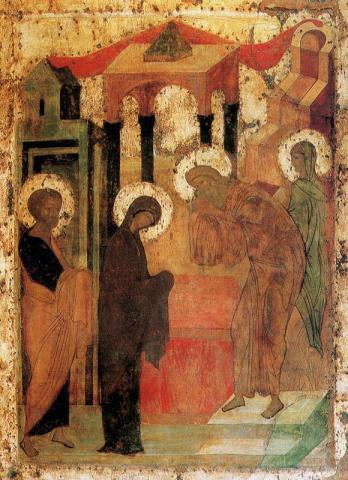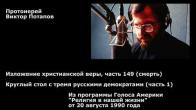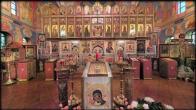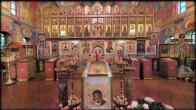You are here
“DOES MY FAITH BRING ME JOY?”

Priest Victor Klimenko. Reflections before the Feast of the Meeting of the Lord
The service of the Meeting of the Lord repeatedly tells us about the joy that the elder Simeon – and, in him, the entire Old Testament Israel – felt when he took in his arms the promised Savior – the infant Christ – brought to the Jerusalem Temple by the Theotokos and the righteous Joseph:
“Today Simeon the Elder enters the temple rejoicing in the spirit…”
“In fear and joy Simeon held the Master in his arms…”
“Tell us Simeon: Whom dost thou bear in thine arms, that thou dost rejoice so greatly in the temple?”
Celebrating the Feast of the Meeting of the Lord – filled with the joy of meeting Christ – we may ask ourselves, “Is there joy from meeting Christ in my life? Does my faith in Christ bring me joy?” What, unfortunately, often happens is that we have been in the Church for quite a while – some for years, some for decades, some since birth – and a moment comes when our spiritual life “levels off.” It becomes some dull supplement to our daily life without any bright events or any particular interest on our part. Day after day we reproduce, semi-mechanically, some habitual spiritual “routine” – understanding that this is something that needs to be done but not always realizing what for.
So, what happens? All this begins, very likely, with the fact that lack of knowledge of the Gospel and the New Testament in general – as well as the absence of the practice of regular reading of the Holy Scripture and reflection upon it – leads to the substitution of the true, joy-filled Christian faith by the religion of fulfillment of a minimal set of requirements with the goal of pacifying one’s conscience and softening up a “strict” God.
Having fallen away from the Gospel, a believer, being used to seeing in the surrounding reality the ubiquitousness of rules, requirements, and other requisites – with respective rewards for compliance and problems in the case of non-compliance – gives in to allowing the same attitude to settle in his spiritual life as well. It becomes shallow. In addition to that, being forced to compete with other daily business and responsibilities, one’s spiritual life loses immediate importance. For that reason, it ends up being slowly reduced to a minimum and pushed out of one’s everyday schedule. Perhaps it even disappears completely because of various excuses: “I don’t have time”, “I get really tired”, etc. Ultimately, it becomes a norm for one to live with a blasphemous desire to “stand out” a church service, to read through the prayer rule as quickly as possible and be done with it, to “fight off” a fast with the least possible sacrifice. Such questionable, joyless religiosity is inevitably accompanied by fears and despondency. Such a person may cease to understand the purpose of his life. Life may start looking to him like a non-stop meaningless run, an unending roller-coaster of random successes and luck, annoyances and injustices.
However, not just the services of the Meeting of the Lord but the entire Gospel, the entire New Testament repeatedly tell us that the coming of Christ into this world is a source of not just joy but joy incomparable to anything else – “great joy” (Luke 2:10), joy that is “full” and “complete” (John 15:11, 16:24, 17:13; 1 John 1:4), joy that nobody can take away from us (John 16:22). Apostle Paul urges the Christians of the early Church to rejoice: “Rejoice always” (1 Thess. 5:16), “…Rejoice in the Lord” (Phil. 3:1), “Rejoice in the Lord always; and again I say, Rejoice” (Phil. 4:4). And we read that “the disciples were filled with joy and with the Holy Spirit” (Acts 13:52).
It is important to remember that, unlike the joy that we are used to in the world that surrounds us, Christian joy is not a consequence of the absence of problems. Christian joy exists despite problems, it is apart from them, it is “not of this world”. This joy is from our soul being touched by God – if, of course, our soul is in a state when such contact is at all possible. Christian joy, in the words of St. Theophan the Recluse, is a reflection of one’s spiritual state.
Many erroneously think that Christian joy is something from the realm of “high spiritual states” accessible only to saints. Others, similarly erroneously, look at joy with suspicion or even with rejection: How can one have joy, they think, when there is so much evil, hatred, and violence in the world? Nonetheless, in the words of Fr. Alexander Schmemann, “inability to have joy – or, more precisely, refusal to have joy” is “the beginning of “false religion””; “…only in relation to [joy] the fear of God, repentance, and humility are correct, true, and fruitful. Outside of this joy [it is]… The religion of fear. The religion of pseudo-humility. The religion of guilt. <…> The fear of sin does not save from sin. The joy in the Lord does.”
So, the presence of joy in the life of a Christian is not an “option” or a “bonus” – but rather a sign that one’s faith is a correct one to start with. “How exposing for [us] is the absence of spiritual joy! – writes St. Theophan the Recluse. – For it is undoubtedly a sign that our Christianness is very deficient, it is lacking a lot…”
How to acquire this joy is frequently mentioned by St. John Chrysostom in his homilies. In his words, “everyone… loves joy but not everyone can achieve it – because they do not know the way that leads to it.” Reflecting upon the Apostle Paul’s exhortation to the Philippians to “rejoice always in the Lord”, the holy hierarch points out that the true joy is unlike the earthly joy that visits us from time to time because of some circumstances. A Christian plants and grows the true joy in himself as a tree – and the root of this joy is precisely the fact that it is “in the Lord.” The root of this joy is the fear of God - the awareness that we always “walk before God.” Unlike the earthly joy – that may come and go – Christian joy, in the words of St. John Chrysostom, is established upon a strong root that is “firm and immovable, and pours out so much joy that we become absolutely insensitive to [various] tribulations.” If we plant this root in ourselves – that is, if we lay in the foundation of all of our actions the awareness of our continual standing before God – then everything that happens to us will be capable of being a source of joy for us.
Why do we not have this joy? “Most of all this joy is being undercut by earthly hopes and earthly tastes, – says St. Theophan, – and the fact that we have no diligence to do every good [the opportunity for which] we encounter: our life is feeble; we live in a perfunctory manner, hobbling along.” Don’t we often have wishful thinking that our spiritual life will somehow straighten itself out later when we have resolved all our problems? For the time being, we prefer seeking earthly joys. We try to fill our time with entertainment, television, the Internet in order to run away from ourselves, in order not to face the real state of our soul, not to let our conscience ask us unpleasant questions. We allow the surrounding reality, the everyday fuss, to fill our mind – which, of course, defines our spiritual state as well. Years are passing by in this joyless existence – precisely because, looking for consolation and joy, we run to the world, to the culture, to the society that are more and more openly hostile to Christianity.
However, in the meantime, “Christ constantly pours out the true joy into the souls of his followers through the Holy Mysteries and virtues” (St. Justin (Popovich). In other words, planting in oneself the root of joy requires from a Christian a conscientious participation in church life and its Sacraments – as well as practical actions aimed at the fulfillment of Christ’s commandments. Joy does not just appear by itself. It requires effort. For example, an effort to make oneself see God’s blessings in our lives, be aware of them, and thank God for them. True joy begins when we start seeing in ourselves small offshoots of positive changes, the first signs of the freedom from being tormented by some particular sin(s). In the words of St. Theophan, “the fundamental basis of the joy of a Christian is the renewal of our fallen essence.” The joy of a Christian is the restoration – by the Holy Spirit, and made possible through Christ’s coming into this world – of the heavenly joy for which man was created by God and which he lost as a result of falling away from God.
Priest Victor Klimenko
Parish Life, February 2016
PARISH LIFE
Address of our Cathedral
Subscribe to our mailing list
While all the materials on this site are copyrighted, you may use them freely as long as you treat them
with respect and provide attribution on the Russian Orthodox Cathedral of St.John the Baptist of Washington DC.









